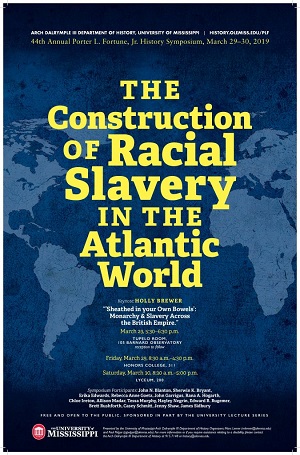
2019: The Construction of Racial Slavery in the Atlantic World
Free Black Vecinos of Late Sixteenth-Century New Spain: Catholicism, Subjecthood, and Interconnected Histories
Document Type
Event
Location
Honors College 311
Start Date
29-3-2019 11:30 AM
End Date
29-3-2019 12:15 PM
Description
The paper traces free Afro-descendants who became colonial settlers in late sixteenth- and early seventeenth-century urban and rural regions of New Spain, particularly in the region between the port of Veracruz and the viceregal capital of Mexico City. The free Afro-descended individuals under study hailed from Castile or other regions of the Hispanic Caribbean and became vecinos in particular sites in late sixteenth-century New Spain. Some accumulated significant property – including, ownership of enslaved black men and women – while maintaining commercial and religious ties in key cities and across the Atlantic. Others composed testaments that organized endowments to churches across the empire that evidence specific theological choices that mirror their geographical trajectories in the Atlantic world. Drawing on a particular case study of a free mulato named Francisco de Carreño and the choices that he made to protect his son’s freedom, this paper explores how individuals navigated and presented various views of the meanings of slavery, freedom, skin color, and royal vassalage in the Castilian empire.
Relational Format
Conference Proceeding
Recommended Citation
Ireton, Chloe, "Free Black Vecinos of Late Sixteenth-Century New Spain: Catholicism, Subjecthood, and Interconnected Histories" (2019). Porter L. Fortune, Jr. Symposium. 9.
https://egrove.olemiss.edu/plf/2019/schedule/9
Free Black Vecinos of Late Sixteenth-Century New Spain: Catholicism, Subjecthood, and Interconnected Histories
Honors College 311
The paper traces free Afro-descendants who became colonial settlers in late sixteenth- and early seventeenth-century urban and rural regions of New Spain, particularly in the region between the port of Veracruz and the viceregal capital of Mexico City. The free Afro-descended individuals under study hailed from Castile or other regions of the Hispanic Caribbean and became vecinos in particular sites in late sixteenth-century New Spain. Some accumulated significant property – including, ownership of enslaved black men and women – while maintaining commercial and religious ties in key cities and across the Atlantic. Others composed testaments that organized endowments to churches across the empire that evidence specific theological choices that mirror their geographical trajectories in the Atlantic world. Drawing on a particular case study of a free mulato named Francisco de Carreño and the choices that he made to protect his son’s freedom, this paper explores how individuals navigated and presented various views of the meanings of slavery, freedom, skin color, and royal vassalage in the Castilian empire.

